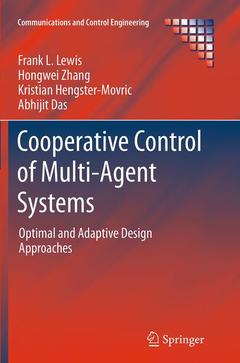Description
Cooperative Control of Multi-Agent Systems, Softcover reprint of the original 1st ed. 2014
Optimal and Adaptive Design Approaches
Communications and Control Engineering Series
Authors: Lewis Frank L., Zhang Hongwei, Hengster-Movric Kristian, Das Abhijit
Language: English
Subjects for Cooperative Control of Multi-Agent Systems:
189.89 €
In Print (Delivery period: 15 days).
Add to cartPublication date: 08-2016
Support: Print on demand
189.89 €
In Print (Delivery period: 15 days).
Add to cartPublication date: 01-2014
307 p. · 15.5x23.5 cm · Hardback
Description
/li>Contents
/li>Biography
/li>Comment
/li>
Cooperative Control of Multi-Agent Systems extends optimal control and adaptive control design methods to multi-agent systems on communication graphs. It develops Riccati design techniques for general linear dynamics for cooperative state feedback design, cooperative observer design, and cooperative dynamic output feedback design. Both continuous-time and discrete-time dynamical multi-agent systems are treated. Optimal cooperative control is introduced and neural adaptive design techniques for multi-agent nonlinear systems with unknown dynamics, which are rarely treated in literature are developed. Results spanning systems with first-, second- and on up to general high-order nonlinear dynamics are presented.
Each control methodology proposed is developed by rigorous proofs. All algorithms are justified by simulation examples. The text is self-contained and will serve as an excellent comprehensive source of information for researchers and graduate students working with multi-agent systems.
Introduction to Synchronization in Nature and Physics and Cooperative Control for Multi-agent Systems on Graphs.- Algebraic Graph Theory and Cooperative Control Consensus.- Part I Distributed Optimal Design for Cooperative Control in Multi-agent Systems on Graphs.- Local Optimal Design for Cooperative Control in Multi-agent Systems on Graphs.- Riccati Design for Synchronization of Discrete-Time Systems.- Cooperative Globally Optimal Control for Multi-agent Systems on Directed Graph Topologies.- Graphical Games: Distributed Multi-player Games on Graphs.- Part II Distributed Adaptive Control for Multi-agent Cooperative Systems.- Graph Laplacian Potential and Lyapunov Functions for Multi-agent Systems.- Cooperative Adaptive Control for Systems with First-Order Nonlinear Dynamics.- Cooperative Adaptive Control for Systems with Second-Order Nonlinear Dynamics.- Cooperative Adaptive Control for Higher-Order Nonlinear Systems.




